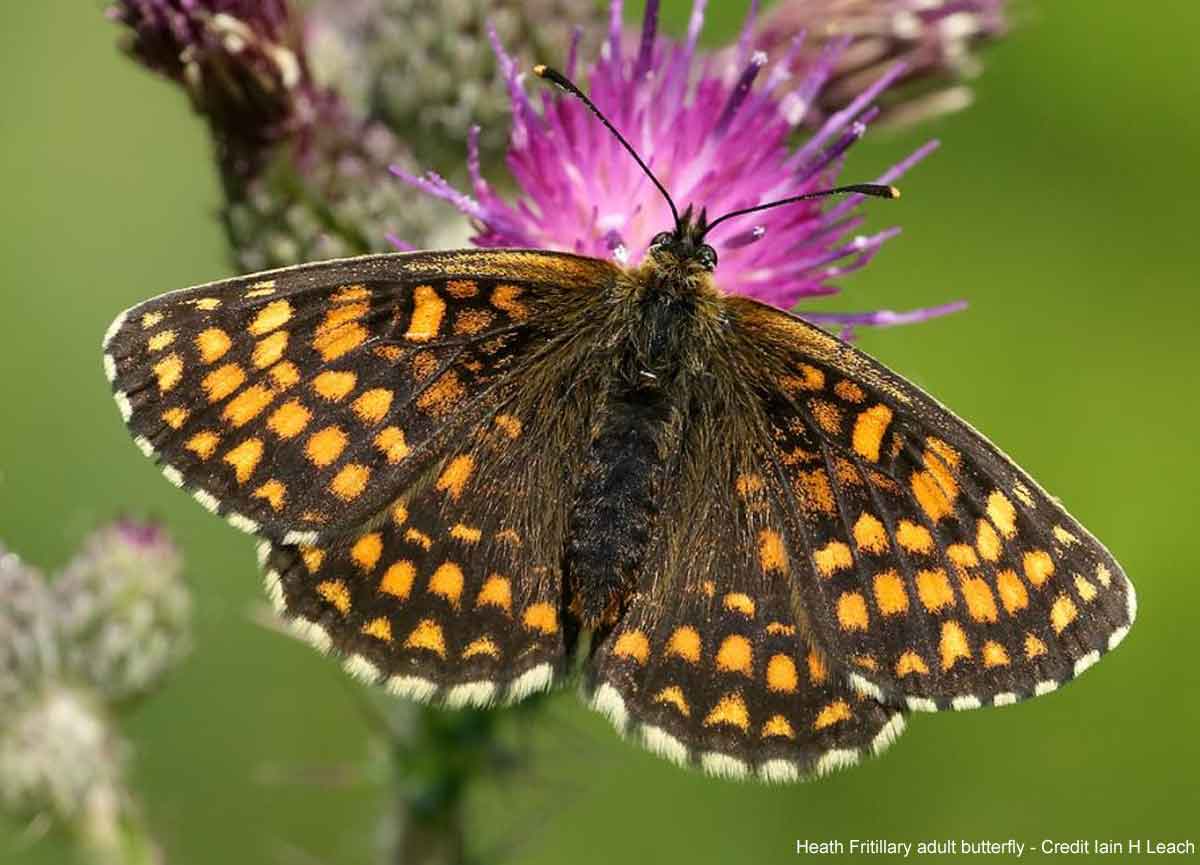The Heath Fritillary, one of the UK’s rarest butterflies which has been brought back from the brink of extinction thanks to conservation efforts in the last 20 years, has been discovered for the first time at the Woodland Trust’s Victory Wood near Whitstable in east Kent.
The discovery of this rare species is the result of a restoration project on the site, which has helped wildlife return to the area.
The original ancient woodland on the Victory Wood site was felled and ploughed up between the 1950s and 1970s and later earmarked as a potential landfill site. It was saved by the Woodland Trust in 2004 and became a flagship site for the Trafalgar Woods Project to commemorate the bicentenary of the Battle of Trafalgar in 1805.


Image left: Heath Fritillary adult butterfly – Credit Iain H Leach
The Woodland Trust has now restored this valuable element in a chain of woodlands, re-connecting it to surviving ancient woodland fragments to both the east and west. This extensive site overlooking the Thames Estuary is open to the public.
Since 2005 the Woodland Trust has been recording the wildlife as it returns to Victory Wood and it is here that the rare Heath Fritillary butterfly has now been found.
Claire Inglis, the Woodland Trust’s Site Manager at the wood said: “The discovery of Heath Fritillary is a wonderful find and comes after many years of hard work from volunteers and members of the Trust to restore the site to some of its former glory. We planted large areas of woodland and ensured buffer zones lined the adjacent ancient woodland areas to encourage natural regeneration. This planting/regeneration in buffer zones, along with maintaining wide rides (trackways), has all been important for the establishment of these special species.
“This rare butterfly returning shows the importance of this work and we hope to discover more species colonising the site in the months and years to come.”
Butterfly Conservation, the UK charity dedicated to the conservation of butterflies, moths and the environment, has been studying and working to conserve the Heath Fritillary since the early 1980s. At that time the Heath Fritillary was thought by many to be on the brink of extinction from the UK. Forty years later, the butterfly, while still limited to just four populations in the UK, is thriving in Kent.
Steve Wheatley, Butterfly Conservation’s Regional Conservation Manager, said: “The return of the Heath Fritillary to Victory Wood is the result of an intricate chain of actions that began when the Woodland Trust started their restoration project.“
“The female Heath Fritillary needs to find the plant Common Cow-wheat to lay eggs for the next generation of caterpillars to feed upon. The Cow-wheat is slow to spread, relying on Wood Ants to carry the seeds to new areas. In order for the Cow-wheat to grow, it needs to take carbon and minerals from the roots of nearby oaks. This relationship between the ants, the trees, the flower, and the butterfly is just magical, and none of this could have happened without the vision of the Woodland Trust.”
Woodland Trust staff alerted Butterfly Conservation to the presence of the Wood Ants and subsequent reappearance of Cow-wheat. In summer 2020 Butterfly Conservation’s Steve Wheatley surveyed the Cow-wheat and determined that it was now becoming sufficiently abundant to support the butterfly.
Several Heath Fritillary were also seen venturing from nearby sites, but proof that they were using the Woodland Trust site and not just flying past or lost would require finding the butterfly in its earlier stages. Returning this Spring, a team of Butterfly Conservation staff, Woodland Trust staff and conservation volunteers searched on hands and knees to look for the caterpillar. Steve’s intuition was proven when he was rewarded by spotting the first caterpillar basking on an Oak leaf next to a clump of nibbled Cow-wheat.
Woodland Trust volunteer Alan Stubbs found the second caterpillar minutes later.S teve explained: “This discovery proves the Heath Fritillary is now resident at Victory Wood and is an example of how working in partnership is having a positive effect on our native species.
”The Heath Fritillary is on the wing now and might be spotted at Victory Wood and other nearby woods.
